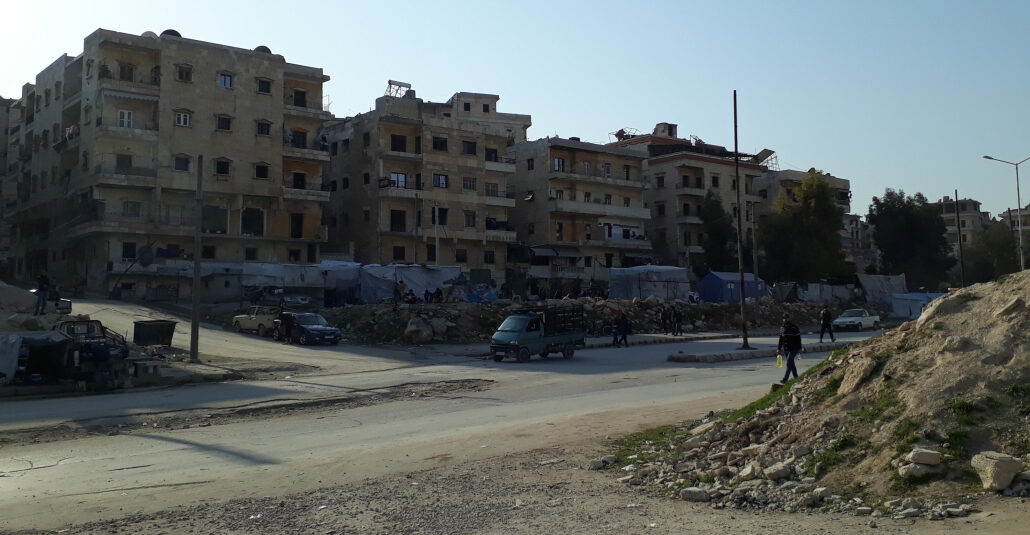Two Kurdish neighborhoods in Aleppo, Sheikh Maqsoud and Ashrafiyeh, are currently besieged by Hayat Tahrir al-Sham (HTS) following the Islamist force’s unexpected advances and capture of Syria’s second-largest city from Bashar al-Assad’s Syrian Arab Army (SAA). These neighborhoods have maintained their autonomy from both the Assad government and the Islamist opposition since the start of the Syrian conflict, becoming a safe haven for those fleeing violence, persecution and violent repression elsewhere in Aleppo and Syria. In this explainer, Rojava Information Center (RIC) provides key information on the neighborhoods, their humanitarian and political significance, the previous violence they have endured, and the grave threat now facing these isolated neighborhoods.

What and where are Sheikh Maqsoud and Ashrafiyeh?
With a population of only around 10,000 prior to the 2011 outbreak of the Syrian revolution, these Kurdish-majority neighborhoods within Syria’s diverse second-largest city Aleppo soon swelled. Their population was reported at 30,000 individuals during 2016. As of 2020, a representative stated the neighborhoods were now home to 30,000 families, giving an estimated population of up to 100,000 individuals. While majority-Kurdish, members of the region’s Christian minorities and Arab families displaced by the war have also found a safe haven in these cities.
“At first, the people who arrived had nothing, so an organization for helping the displaced people was built up. Many houses were empty because the Islamist militias had damaged them, or they had been burnt and looted. The organization found homes for those who did not have any money. Families moved into houses that had been abandoned but were still inhabitable and just needed to be repaired and refurbished. Organization like the Kurdish Red Crescent also took care of the displaced and distributed blankets and clothes.” – Sheikh Maqsoud Council member, 2020
What was the situation in Sheikh Maqsoud and Ashrafiyeh prior to the HTS advance?
Since the outbreak of the Syrian revolution, the two neighborhoods have remained under the political administration of what is now the multi-ethnic Democratic Autonomous Administration of North and East Syria (DAANES), and protected by Kurdish People’s and Women’s Protection Units (YPG and YPJ), alongside the Kurdish-led Internal Security Forces (Asayish). The neighborhoods were among the first Kurdish regions to rise up against the Assad government, and subsequently endured successive attacks, embargoes and sieges by both Islamist armed groups and pro-Assad forces.
These regions are isolated from the contiguous regions under the control of the DAANES, and govern themselves autonomously while retaining political and humanitarian ties to the DAANES, and also latterly a pragmatic relationship with the Assad government following the recapture of the city from the Islamist militias. Electricity and water was allowed to enter the districts, while there was also coordination for education provision. This enabled the neighborhood administration to continue building a network of district-level communes and implementing its stated goals of women’s autonomy and ethnic minority participation, retaining political autonomy despite the close presence of hostile forces.

What prior violence have Sheikh Maqsoud and Ashrafiyeh faced?
Despite reaching pragmatic arrangements with both the Islamist opposition and Assad government, the Kurdish neighborhoods have faced repeated violence from both parties. Anti-Assad Kurdish protesters were shot dead by the SAA in the early stages of the revolution. After the remainder of Aleppo fell to the Syrian opposition, up to a thousand locals were killed or wounded in attacks on the neighborhood, which endured severe economic deprivation amid siege conditions. In 2016, Amnesty International described indiscriminate shelling of Sheikh Maqsoud by Islamist groups including Ahrar al-Sham and Jaysh al-Islam as amounting to war crimes. The rights watchdog documented the death of at least 83 civilians, including 30 children, in attacks which Amnesty reported may have involved the use of chlorine, a banned chemical weapon.
Following the SAA’s subsequent recapture of Aleppo, the security situation has generally improved. However, the Kurdish neighborhoods have at times been placed under conditions of siege by the Assad government as a way to exert political pressure on the DAANES by preventing the entry of fuel and other essential supplies. These measures led to critical fuel and medicine shortages, worsening humanitarian conditions in the neighborhoods.

What is the current situation in Sheikh Maqsoud and Ashrafiyeh?
The situation here is difficult for the civilian population; for the past four days, no fresh food has gotten into the neighborhood, and the water was recently cut off. We don’t know how the situation will turn out in Aleppo, because these forces all impose Islam through violence. In Aleppo, there are Kurds, Christians, Yezidis, and many ethnic and religious groups. These groups face severe danger, because [HTS] thinks like ISIS. They don’t accept these minorities, and force women to cover their heads. Just as ISIS entered Mosul, in Iraq, [HTS] have now entered all the neighborhoods of Aleppo, apart from Sheikh Maqsoud, where Kurds, Arabs and Syriac Christians all live together. – Kurdish media worker in Sheikh Maqsoud, 2 December 2024
Following the dramatic advance spearheaded by HTS, in collaboration with Turkish-controlled militias under the banner of the Syrian National Army (SNA), authoritarian Islamist and jihadist forces have once again taken control of all surrounding regions of Aleppo, leaving the neighborhoods under renewed conditions of siege. There have been outbursts of violence around the edges of the neighborhoods, including sniper fire and the reported capture of female YPJ fighters by HTS. Residents state they dread the return of authoritarian Islamist rule to Aleppo, and particularly the highly negative impact on women and ethnic minorities, who had enjoyed unprecedented freedom under the DAANES. As of December 2, 2024, negotiations are reportedly underway over potential security measures enabling Kurdish residents to remain in place, with many thousands of residents unwilling to flee their homes even at the risk of imminent violence.

